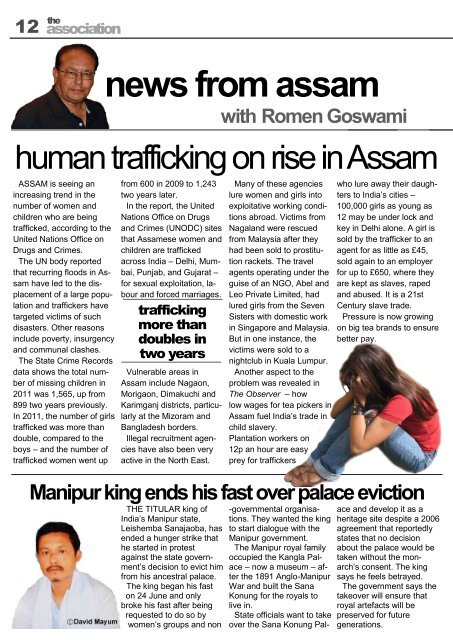the association 2013
Create successful ePaper yourself
Turn your PDF publications into a flip-book with our unique Google optimized e-Paper software.
12 <strong>the</strong><br />
<strong>association</strong><br />
news from assam<br />
with Romen Goswami<br />
human trafficking on rise in Assam<br />
ASSAM is seeing an<br />
increasing trend in <strong>the</strong><br />
number of women and<br />
children who are being<br />
trafficked, according to <strong>the</strong><br />
United Nations Office on<br />
Drugs and Crimes.<br />
The UN body reported<br />
that recurring floods in Assam<br />
have led to <strong>the</strong> displacement<br />
of a large population<br />
and traffickers have<br />
targeted victims of such<br />
disasters. O<strong>the</strong>r reasons<br />
include poverty, insurgency<br />
and communal clashes.<br />
The State Crime Records<br />
data shows <strong>the</strong> total number<br />
of missing children in<br />
2011 was 1,565, up from<br />
899 two years previously.<br />
In 2011, <strong>the</strong> number of girls<br />
trafficked was more than<br />
double, compared to <strong>the</strong><br />
boys – and <strong>the</strong> number of<br />
trafficked women went up<br />
from 600 in 2009 to 1,243<br />
two years later.<br />
In <strong>the</strong> report, <strong>the</strong> United<br />
Nations Office on Drugs<br />
and Crimes (UNODC) sites<br />
that Assamese women and<br />
children are trafficked<br />
across India – Delhi, Mumbai,<br />
Punjab, and Gujarat –<br />
for sexual exploitation, labour<br />
and forced marriages.<br />
trafficking<br />
more than<br />
doubles in<br />
two years<br />
Vulnerable areas in<br />
Assam include Nagaon,<br />
Morigaon, Dimakuchi and<br />
Karimganj districts, particularly<br />
at <strong>the</strong> Mizoram and<br />
Bangladesh borders.<br />
Illegal recruitment agencies<br />
have also been very<br />
active in <strong>the</strong> North East.<br />
Many of <strong>the</strong>se agencies<br />
lure women and girls into<br />
exploitative working conditions<br />
abroad. Victims from<br />
Nagaland were rescued<br />
from Malaysia after <strong>the</strong>y<br />
had been sold to prostitution<br />
rackets. The travel<br />
agents operating under <strong>the</strong><br />
guise of an NGO, Abel and<br />
Leo Private Limited, had<br />
lured girls from <strong>the</strong> Seven<br />
Sisters with domestic work<br />
in Singapore and Malaysia.<br />
But in one instance, <strong>the</strong><br />
victims were sold to a<br />
nightclub in Kuala Lumpur.<br />
Ano<strong>the</strong>r aspect to <strong>the</strong><br />
problem was revealed in<br />
The Observer – how<br />
low wages for tea pickers in<br />
Assam fuel India’s trade in<br />
child slavery.<br />
Plantation workers on<br />
12p an hour are easy<br />
prey for traffickers<br />
who lure away <strong>the</strong>ir daughters<br />
to India’s cities –<br />
100,000 girls as young as<br />
12 may be under lock and<br />
key in Delhi alone. A girl is<br />
sold by <strong>the</strong> trafficker to an<br />
agent for as little as £45,<br />
sold again to an employer<br />
for up to £650, where <strong>the</strong>y<br />
are kept as slaves, raped<br />
and abused. It is a 21st<br />
Century slave trade.<br />
Pressure is now growing<br />
on big tea brands to ensure<br />
better pay.<br />
Manipur king ends his fast over palace eviction<br />
THE TITULAR king of<br />
India’s Manipur state,<br />
Leishemba Sanajaoba, has<br />
ended a hunger strike that<br />
he started in protest<br />
against <strong>the</strong> state government’s<br />
decision to evict him<br />
from his ancestral palace.<br />
The king began his fast<br />
on 24 June and only<br />
broke his fast after being<br />
requested to do so by<br />
women’s groups and non<br />
-governmental organisations.<br />
They wanted <strong>the</strong> king<br />
to start dialogue with <strong>the</strong><br />
Manipur government.<br />
The Manipur royal family<br />
occupied <strong>the</strong> Kangla Palace<br />
– now a museum – after<br />
<strong>the</strong> 1891 Anglo-Manipur<br />
War and built <strong>the</strong> Sana<br />
Konung for <strong>the</strong> royals to<br />
live in.<br />
State officials want to take<br />
over <strong>the</strong> Sana Konung Palace<br />
and develop it as a<br />
heritage site despite a 2006<br />
agreement that reportedly<br />
states that no decision<br />
about <strong>the</strong> palace would be<br />
taken without <strong>the</strong> monarch’s<br />
consent. The king<br />
says he feels betrayed.<br />
The government says <strong>the</strong><br />
takeover will ensure that<br />
royal artefacts will be<br />
preserved for future<br />
generations.


